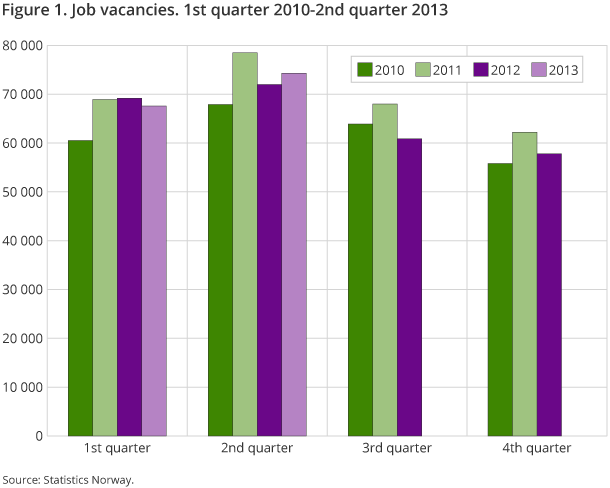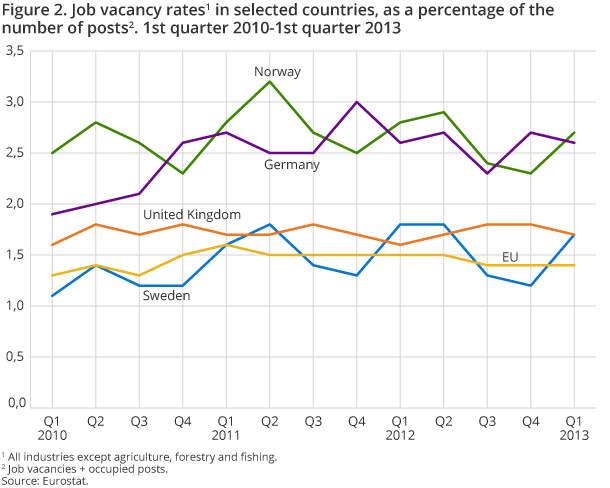Content
Published:
This is an archived release.
Increase in job vacancies
There were 74 300 job vacancies in the 2nd quarter of 2013. This is an increase of 2 400 compared to the 2nd quarter of 2012. The increase mainly occurred in domestic trade and construction.
| 2nd quarter 2013 | Change from the previous year | |
|---|---|---|
| Job vacancies | 74 300 | 2 400 |
| Job vacancy rate | 2.9 | 0.0 |
Despite the number of job vacancies increasing by 2 400 from the 2nd quarter of 2012 to the 2nd quarter of 2013, the percentage of job vacancies was the same in both quarters; 2.9 per cent. This share is measured as a percentage of the total number of jobs, i.e. the number of employees and vacancies. During the last year, the increase in job vacancies has been at approximately the same level as the increase in the total number of jobs.
Decrease in manufacturing and mining
In domestic trade there was an increase of 2 100 job vacancies compared to last year, while the increase in construction was 1 500 job vacancies. Manufacture, as well as mining and quarrying had a decrease in the number of job vacancies the last year. Manufacture is now one of the major industry divisions with the lowest percentage of job vacancies, with 1.7 per cent. Mining and quarrying has 3.2 per cent.
Administrative and support service activities had the highest percentage of job vacancies with 6.0 per cent. This is a decrease of 800 job vacancies in the past year.
Increase in social work and residential care
There were 12 600 job vacancies in social work activities without accommodation and residential care activities, which is 600 more than last year. Within education, there were 6 000 job vacancies. This is twice as many as the other quarters. The reason for this is that many jobs are advertised in this quarter in order to prepare for schools opening in the autumn.
Decrease in the job vacancy rate in the EU countries
The job vacancy rate in the EU was 1.4 per cent in the 1st quarter of 2013; a decrease of 0.1 percentage points from the same quarter last year. The comparison with other countries is based on the 1st quarter of 2013, as the figures for the 2nd quarter of 2013 have not yet been published.
The job vacancy rates between countries in the EEA area vary considerably. Poland had the lowest rate of job vacancies at 0.4 per cent. The rate in Sweden and Germany was 1.7 per cent and 2.6 per cent respectively. As a comparison, Norway had a job vacancy rate of 2.7 in this quarter. More information is available on Eurostat’s website.
Contact
-
Arbeidsmarked og lønn
E-mail: arbeidsmarked@ssb.no
-
Rakel Gading
E-mail: rakel.gading@ssb.no
tel.: (+47) 40 81 14 75
-
Jan Sebastian Rothe
E-mail: jan.rothe@ssb.no
tel.: (+47) 91 31 99 06


